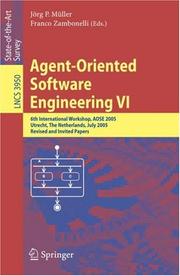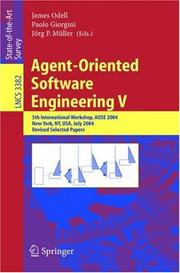| Listing 1 - 5 of 5 |
Sort by
|
Book
Year: 1981 Publisher: [place of publication not identified] [publisher not identified]
Abstract | Keywords | Export | Availability | Bookmark
 Loading...
Loading...Choose an application
- Reference Manager
- EndNote
- RefWorks (Direct export to RefWorks)

ISBN: 1280635266 9786610635269 1601199546 3540338764 3540338756 Year: 2006 Volume: v. 28 Publisher: Berlin : Springer-Verlag,
Abstract | Keywords | Export | Availability | Bookmark
 Loading...
Loading...Choose an application
- Reference Manager
- EndNote
- RefWorks (Direct export to RefWorks)
The area intersecting supply chains management with multiagent systems has attracted in the last decade books, workshops, conferences, etc. Recently however, multiagent systems have became more formal borrowing from operations research, game theory and other facets from distributed decision making. The authors takes a close look at what has been done recently in the field of supply chain management using agent technology and more specifically multiagent systems. The book contains sixteen chapters organized in four main parts; Introductory Papers; Multiagent Based Supply Chain Modeling, Collaboration and Coordination Between Agents in a Supply Chain and Multiagent Based Supply Chain Management: Applications. This book is intended as reference material for researchers, graduate students, and practitioners alike who are interested in pursuing research and development in this area, and who need for that, a comprehensive view of the existing literature, and some ideas for future directions.
Business logistics --- Intelligent agents (Computer software) --- Data processing. --- Agents, Autonomous (Computer software) --- Agents, Cognitive (Computer software) --- Agents, Intelligent (Computer software) --- Assistants, Cognitive (Computer software) --- Assistants, Intelligent software --- Autonomous agents (Computer software) --- Cognitive agents (Computer software) --- Cognitive assistants (Computer software) --- IAs (Computer software) --- Intelligent agent software --- Intelligent software agents --- Intelligent software assistants --- Software agents (Computer software) --- Special agents (Computer software) --- Artificial intelligence --- Computer programs --- Engineering mathematics. --- Artificial intelligence. --- Mathematical and Computational Engineering. --- Artificial Intelligence. --- AI (Artificial intelligence) --- Artificial thinking --- Electronic brains --- Intellectronics --- Intelligence, Artificial --- Intelligent machines --- Machine intelligence --- Thinking, Artificial --- Bionics --- Cognitive science --- Digital computer simulation --- Electronic data processing --- Logic machines --- Machine theory --- Self-organizing systems --- Simulation methods --- Fifth generation computers --- Neural computers --- Engineering --- Engineering analysis --- Mathematical analysis --- Mathematics --- Applied mathematics.

ISBN: 9783540340973 3540340971 3540340998 Year: 2006 Publisher: Berlin ; New York : Springer,
Abstract | Keywords | Export | Availability | Bookmark
 Loading...
Loading...Choose an application
- Reference Manager
- EndNote
- RefWorks (Direct export to RefWorks)
Agent and multiagent concepts offer higher level abstractions and mechanisms which address issues such as knowledge representation and reasoning, communication, coordination, cooperation among heterogeneous and autonomous parties, perception, commitments, goals, beliefs, and intentions all of which need conceptual modeling. The AOSE 2005 workshop sought to examine the credentials of agent-based approaches as a software engineering paradigm, and to gain an insight into what agent-oriented software engineering will look like, and what its benefits will be. This book represents the thoroughly refereed post-proceedings of the 6th International Workshop on Agent-Oriented Software Engineering, AOSE 2005, held in Utrecht, The Netherlands, in July 2005 as part of AAMAS 2005. The 18 revised full papers were carefully selected from 35 submissions during two rounds of reviewing and improvement. The papers are organized in topical sections on modeling tools, analysis and validation tools, multiagent systems design, implementation tools, and experiences and comparative evaluations.
Software engineering --- Intelligent agents (Computer software) --- Génie logiciel --- Agents intelligents (Logiciels) --- Congresses. --- Congrès --- Computer Science --- Engineering & Applied Sciences --- Information Technology --- Software Engineering --- Computer science. --- Computer communication systems. --- Software engineering. --- Computer programming. --- Computer logic. --- Artificial intelligence. --- Computer Science. --- Software Engineering/Programming and Operating Systems. --- Software Engineering. --- Artificial Intelligence (incl. Robotics). --- Logics and Meanings of Programs. --- Programming Techniques. --- Computer Communication Networks. --- AI (Artificial intelligence) --- Artificial thinking --- Electronic brains --- Intellectronics --- Intelligence, Artificial --- Intelligent machines --- Machine intelligence --- Thinking, Artificial --- Bionics --- Cognitive science --- Digital computer simulation --- Electronic data processing --- Logic machines --- Machine theory --- Self-organizing systems --- Simulation methods --- Fifth generation computers --- Neural computers --- Computer science logic --- Logic, Symbolic and mathematical --- Computers --- Electronic computer programming --- Electronic digital computers --- Programming (Electronic computers) --- Coding theory --- Computer software engineering --- Engineering --- Communication systems, Computer --- Computer communication systems --- Data networks, Computer --- ECNs (Electronic communication networks) --- Electronic communication networks --- Networks, Computer --- Teleprocessing networks --- Data transmission systems --- Digital communications --- Electronic systems --- Information networks --- Telecommunication --- Cyberinfrastructure --- Network computers --- Informatics --- Science --- Programming --- Distributed processing --- Logic design. --- Artificial Intelligence. --- Design, Logic --- Design of logic systems --- Digital electronics --- Electronic circuit design --- Logic circuits --- Switching theory

ISBN: 3540242864 3540305785 Year: 2005 Publisher: Berlin ; New York : Springer,
Abstract | Keywords | Export | Availability | Bookmark
 Loading...
Loading...Choose an application
- Reference Manager
- EndNote
- RefWorks (Direct export to RefWorks)
The explosive growth of application areas such as electronic commerce, enterprise resource planning and mobile computing has profoundly and irreversibly changed our views on software systems. Nowadays, software is to be based on open architectures that continuously change and evolve to accommodate new components and meet new requirements. Software must also operate on different platforms, without recompilation, and with minimal assumptions about its operating environment and its users. Furthermore, software must be robust and ¨ autonomous, capable of serving a naive user with a minimum of overhead and interference. Agent concepts hold great promise for responding to the new realities of software systems. They offer higher-level abstractions and mechanisms which address issues such as knowledge representation and reasoning, communication, coordination, cooperation among heterogeneous and autonomous parties, perception, commitments, goals, beliefs, and intentions, all of which need conceptual modelling. On the one hand, the concrete implementation of these concepts can lead to advanced functionalities, e.g., in inference-based query answering, tra- action control, adaptive workflows, brokering and integration of disparate information sources, and automated communication processes. On the other hand, their rich representational capabilities allow more faithful and flexible treatments of complex organizational processes, leading to more effective requirements analysis and architectural/detailed design.
Software engineering --- Intelligent agents (Computer software) --- Computer Science --- Engineering & Applied Sciences --- Information Technology --- Software Engineering --- Computer science. --- Computer communication systems. --- Software engineering. --- Computer programming. --- Computer logic. --- Artificial intelligence. --- Computer Science. --- Software Engineering/Programming and Operating Systems. --- Software Engineering. --- Artificial Intelligence (incl. Robotics). --- Logics and Meanings of Programs. --- Programming Techniques. --- Computer Communication Networks. --- AI (Artificial intelligence) --- Artificial thinking --- Electronic brains --- Intellectronics --- Intelligence, Artificial --- Intelligent machines --- Machine intelligence --- Thinking, Artificial --- Bionics --- Cognitive science --- Digital computer simulation --- Electronic data processing --- Logic machines --- Machine theory --- Self-organizing systems --- Simulation methods --- Fifth generation computers --- Neural computers --- Computer science logic --- Logic, Symbolic and mathematical --- Computers --- Electronic computer programming --- Electronic digital computers --- Programming (Electronic computers) --- Coding theory --- Computer software engineering --- Engineering --- Communication systems, Computer --- Computer communication systems --- Data networks, Computer --- ECNs (Electronic communication networks) --- Electronic communication networks --- Networks, Computer --- Teleprocessing networks --- Data transmission systems --- Digital communications --- Electronic systems --- Information networks --- Telecommunication --- Cyberinfrastructure --- Network computers --- Informatics --- Science --- Programming --- Distributed processing --- Logic design. --- Artificial Intelligence. --- Design, Logic --- Design of logic systems --- Digital electronics --- Electronic circuit design --- Logic circuits --- Switching theory
Book
ISSN: 18651348 ISBN: 3642285627 3642285635 Year: 2012 Volume: 98 Publisher: Berlin ; New York : Springer,
Abstract | Keywords | Export | Availability | Bookmark
 Loading...
Loading...Choose an application
- Reference Manager
- EndNote
- RefWorks (Direct export to RefWorks)
The ATOP (Agent-Based Technologies and Applications for Enterprise Interoperability) workshop series focuses on technologies that support interoperability in networked organizations, on successful applications of these technologies, and on lessons learned. In particular, ATOP brings together research combining ideas from MDA and SOA with agent technologies. The ATOP 2009 and 2010 workshops were held at the AAMAS conferences in Budapest, Hungary, in May 2009, and in Toronto, Canada, in May 2010.The 11 papers presented here were carefully reviewed by three members of the international Program Committee and selected out of 25 contributions to the workshops. The topics covered are modeling interoperable systems; semantic approaches to enterprise interoperability; and interoperable business processes and business interactions. These papers are completed by an invited contribution reporting on OMG agent standardization.The main goal was to collect approaches for the application of agent technologies in these areas. Current trends in the development of agent technologies are compared with recent developments in service-oriented and model-driven system design, with respect to their ability to solve interoperability problems.
Commerce --- Business & Economics --- Commerce - General --- Multiagent systems --- Enterprise application integration (Computer systems) --- Business --- Data processing --- Application integration, Enterprise (Computer systems) --- EAI (Computer systems) --- Integration, Enterprise application (Computer systems) --- Agent-based model (Computer software) --- MASs (Multiagent systems) --- Multi-agent systems --- Systems, Multiagent --- Business. --- Information technology. --- Artificial intelligence. --- Application software. --- Business and Management. --- IT in Business. --- Information Systems Applications (incl. Internet). --- Artificial Intelligence (incl. Robotics). --- Computer Appl. in Administrative Data Processing. --- Data processing. --- Application computer programs --- Application computer software --- Applications software --- Apps (Computer software) --- Computer software --- AI (Artificial intelligence) --- Artificial thinking --- Electronic brains --- Intellectronics --- Intelligence, Artificial --- Intelligent machines --- Machine intelligence --- Thinking, Artificial --- Bionics --- Cognitive science --- Digital computer simulation --- Electronic data processing --- Logic machines --- Machine theory --- Self-organizing systems --- Simulation methods --- Fifth generation computers --- Neural computers --- IT (Information technology) --- Technology --- Telematics --- Information superhighway --- Knowledge management --- Trade --- Economics --- Management --- Industrial management --- Application software --- Systems engineering --- Intelligent agents (Computer software) --- Development --- Information systems. --- Artificial Intelligence. --- Business—Data processing. --- Business information services. --- Information technology --- Computer and Information Systems Applications. --- Computer Application in Administrative Data Processing. --- Management. --- Business enterprises --- Information services
| Listing 1 - 5 of 5 |
Sort by
|

 Search
Search Feedback
Feedback About UniCat
About UniCat  Help
Help News
News